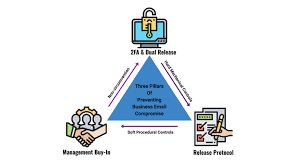Ever wonder how businesses protect themselves from email fraud? Business Email Compromise (BEC) is a serious threat. Cybercriminals use it to steal money and sensitive information. But there are ways to prevent it. Let’s explore the key features that can help prevent BEC.
Understanding Business Email Compromise
BEC involves hackers gaining access to a business email account. They use this access to trick employees or partners into sending money or sensitive data. This type of fraud can cause significant financial loss and damage a company’s reputation. Understanding the key features to prevent Business Email Compromise is crucial for any business.
According to Barracuda, “Business email compromise (BEC) is an exploit in which an attacker obtains access to a business email account and imitates the owner’s identity, in order to defraud the company and its employees, customers or partners.”
Multi-Factor Authentication (MFA)
Multi-Factor Authentication (MFA) adds an extra layer of security. It requires users to provide two or more verification factors. This could be a password and a code sent to a mobile device. Implementing MFA makes it much harder for attackers to access email accounts. It is a simple yet effective way to enhance security.
Email Encryption
Email encryption protects the contents of your emails. It ensures that only the intended recipient can read the message. Encryption prevents unauthorized access to sensitive information. By using email encryption, businesses can secure their communications. This is especially important for emails containing financial or personal data.
Employee Training
Regular training for employees is essential. Employees should know how to recognize phishing attempts and other email threats. Training should cover identifying suspicious emails and what steps to take if they receive one. Educated employees are the first line of defense against Business Email Compromise.
Strong Password Policies
Strong password policies are crucial. Require employees to use complex passwords and change them regularly. Passwords should include a mix of letters, numbers, and symbols. Enforcing strong password policies makes it more difficult for hackers to access email accounts.
Email Monitoring
Monitoring email activity helps detect unusual behavior. Set up alerts for suspicious login attempts or unexpected changes in email settings. Regular monitoring allows businesses to quickly identify and respond to potential threats. This proactive approach can prevent serious security breaches.
Spam Filters and Anti-Phishing Tools
Spam filters and anti-phishing tools block malicious emails. These tools can identify and filter out suspicious messages before they reach the inbox. By using these tools, businesses can reduce the risk of employees falling victim to phishing scams.
Regular Security Audits
Conducting regular security audits is important. Audits help identify vulnerabilities in your email systems. They ensure that security measures are up to date. Addressing any weaknesses found during the audit can strengthen overall email security.
Incident Response Plan
Having an incident response plan is vital. A well-defined plan outlines steps to take if a BEC occurs. This includes who to contact, how to contain the breach, and how to recover. A response plan can minimize damage and speed up recovery.
Secure Email Gateway
A secure email gateway provides an additional layer of protection. It filters emails before they reach the user’s inbox. The gateway can detect and block malicious content and suspicious attachments. This reduces the risk of Business Email Compromise significantly.
Conclusion
Preventing Business Email Compromise requires a multi-faceted approach. Key steps include implementing MFA, using email encryption, and regular employee training. Strong password policies, email monitoring, and anti-phishing tools enhance security. Regular security audits and having an incident response plan are also crucial. A secure email gateway adds another layer of protection.
By adopting these advanced security features, businesses can protect themselves from email fraud. It ensures that sensitive information remains secure and reduces the risk of financial loss. In today’s digital world, robust email security is essential for maintaining trust and protecting business assets. Take proactive measures now to safeguard your business against Business Email Compromise.




